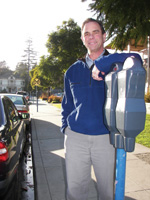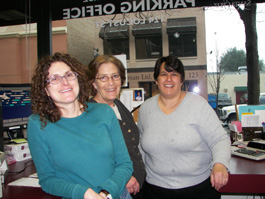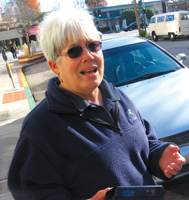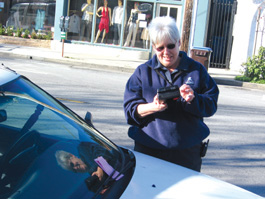home | metro santa cruz index | features | santa cruz | feature story

Photograph by Laura Mattingly
Parking visionary: Matt Ferrell, director of Parking Programs for the
city of Santa Cruz, rules the meters fairly and rides his bicycle to work.
Enforce This!
Despite the dreaded boots, indiscriminate tickets and angry mob of citizens outside their downtown fishbowl, parking enforcement people are not the fascists you might think
By Laura Mattingly
'Shit. Another parking ticket."
The phrase in my mouth has become as familiar to me as my own name during the eight months I've lived in downtown Santa Cruz. Like many downtown renters, my building provides no space for parking, and no option for a street permit. The closest parking structure with room available in it is about four blocks away, at $48 for a three-month term. Many times I'd park my car closer to my apartment at night, after the meters fell asleep, but would forget to move it in the morning, and return to my car later that day, or the next, to find one or more festive pink presents on the dash.
If I'm late paying the tickets, the price goes up from $20/$25 to $50/$55. On months I'm short funds to renew my structure permit, I might try to stash my vehicle in a private commercial lot, reasoning that I wouldn't be depriving any Trader Joe's shopper of a spot at 2am. Towed.
Eight months after moving downtown, I'd spent well over a thousand dollars between major and minor parking-related catastrophes.
Considering I didn't happen to choose being a brain surgeon as a profession, and I have not, as of yet, married one, a grand is a heck of a lot of money.
And though between my new-to-town-ness and my often scatterbrained nature, I was sure my predicament was more extreme than most, I also knew I was not alone.
Every day, walking past the parking ticket office on Locust Street on my way from home to work, I would witness spontaneous displays of hysteria from people standing at the outside of the window. (That hysteria increased when the Sentinel warned that the fee for not paying a fine was going up to $300; what the paper left out was the fact that this was not for parking tickets, but for moving violations.)
Santa Cruz being a peaceful place, I automatically identified these grotesque outbursts as a symptom of some greater tension. And though I felt no small degree of repulsion at their abusive behavior toward the window attendants, part of me identified with their passion, their arm-flailing, their eye-bulging, that really gross vein protruding from their necks; these were small Davids being squashed by an unforgiving parking enforcement Goliath.
Paying tickets became a Sisyphean struggle that dipped heavily into my food funds. I was hungry. And I wanted to hate someone.
The parking-ticket-window-ladies couldn't be the objects of my disdain, though. They were sympathetic to my plight, even motherly. One cold morning a line of 10 or more unamused, shivering people lined up outside the parking office windows to pay their dues. A man at the window had his toddler propped up on the ledge, and I could hear one parking lady clucking heartily into her microphone, "Careful of that metal ledge. In the summer, you can fry an egg on it, and in the winter, it's freezing!"
But there had to be someone to hang for this madness. I decided I would write a story, highly investigative, to blow this parking labyrinth wide open, and ruthlessly unmask the villains.
A Visit to the Ayatollah
I began my search with Matt Ferrell, director of Parking Programs, who I was quite certain would be the key to this entire heinous mess. Even his wife calls him the "Parking Ayatollah." That had to mean something, right? I resolved to take the Public Works office by storm. I would demand numbers. "How many others are there? How much are you stealing from the peaceful citizens of Santa Cruz? How can you sleep at night?"
But upon meeting him, even the Parking Ayatollah seems to be an unnervingly reasonable man.
He walks me through the numbers, and for the fiscal year ending May 2006, "total citation revenue" for the city of Santa Cruz added up to $1,720,075.33, nearly all of which was concentrated in the downtown parking district. The total number of citations: 68,461.
But Ferrell isn't the Dr. Jekyll I had anticipated, orchestrating this all on his own. Restricted parking areas, and even meters, are largely established and installed in conjunction with residential parking permit programs. And residents had asked for these programs, even petitioned for them, usually in response to highly compacted situations. Residents couldn't park in front of their dwellings. Two-thirds of the residents on a given street have to sign the petition and understand what it entails before a program can be implemented. So democracy is behind all of this. I feel oddly like Marlow, traveling into the Heart of Darkness to bust Kurtz, and finding that he himself is as much the enemy as anyone.
"In the mid-'80s we started to receive requests from neighborhoods for residential permit parking programs," says Ayatollah Ferrell. "The first residential parking permit program we implemented was in the beach area." From there, permit programs sprang up across the river in Buena Vista, the Seabright area and surrounding the university on the West Side and above Mission Street.
In the late '80s, residents initiated permit programs on the east side, and in 1992, in the downtown neighborhood.
"We're selling about--I don't have an exact count--but it's over 3,000 residential permits a year. In the very beginning, that wasn't anything the city was engaged in in any meaningful way. We had a few permits for people to park at meters and that was it."
The money made from residential permits alone in fiscal year ending June 2006 totaled $161,000.
So where's this money going to?
Money collected from downtown meters, and permits, totaling $1,603,000 last year, goes back into parking development and maintenance for the whole city. Money collected from meters and permits outside the downtown zone, as well as residential permits, and parking citations, totaling $3,331,000 last year, goes into the city's general fund, spent on services such as police, fire and parks and recreation.
The Ayatollah's salary tops out at $88,764 a year for his efforts.
But no one, no matter what their position in the parking hierarchy, is exempt from the dreaded parking ticket.
"In December I got two parking tickets," said Ferrel. "I don't drive to work, I ride my bike to work. But what happens is that, when I do drive to work, I forget to feed the meter because, you know, I get out of the habit. And then, of course, I come back to my car and there will be a ticket on my windshield, so you know ..." The Ayatollah grows sheepish.
But contrary to common belief, the number of parking tickets distributed is actually going down.
"Our policy has kind of evolved in terms of enforcement. Now, the enforcement officers have a lot more discretion than when I first started working here about how they handle a parking ticket."
According to Ferrell, if you make it back to your vehicle with money in hand for the meter before the enforcement officer has placed the ticket on the dash, often times they won't issue the citation. "There used to be a more black and white approach to the situation. ... And I think it has made the job a little bit easier for the enforcement officers than it was before. Speaking historically from where we started and where we are now, we don't issue as many citations as we did when we first got here."
Regardless of this slight comfort, I moved out of my Locust Street apartment on Feb. 1, and into a shared house with a large driveway.

Photograph by Laura Mattingly
Friendly fish: Whether you consider the Santa Cruz parking office to be
the inside or outside of the fishbowl, the staff is the friendliest you'll find.
Inside the Fishbowl
The enormous bullet-proof fishbowl in the middle of town at 124 Locust St. serves as a location for Santa Cruzans and visitors to pay off parking tickets and get permits, but also functions as a great-glass-barometer, indicating in magnified, theatrical terms, just how compacted the city has become.
Ferrell leads me into the office, for a view from inside the fishbowl.
"We're not in the fishbowl! It's the rest of the world that's in a bowl, we're here to observe all of them," says Claudia Carlson, parking office supervisor, accompanied by the laughter of two parking office representatives.
Ferrell recalls how, 20 years ago, the responsibility for parking citations was moved out of the city courthouse and into its first independent office.
"And so they set up these guys," says Ferrell, affectionately referring to the parking office staff. "You know where the window is where you go to buy your tickets at the civic auditorium, and there's a window that nobody uses any more, over on the opposite side? There was a little office that was like--"
Carlson cuts him off to interject, "It was a walk-in closet."
"And they had like three people in there," says Ferrell.
"Two of us were pregnant at the same time," says Carlson, who started work for the office two weeks after it opened, in March of '86. "We literally had to turn sideways to get past each other. 'Temporarily' for seven years," says Carlson in mock-bitterness.
"We used the floor for filing," Carlson continues. "We couldn't have a photo copier, there was just no place to put it, so we had to go across the street."
"Getting these guys a decent office was one of my biggest career accomplishments," says Ferrell.
"And here we are."
"It was a hard place to find. But the trade off is we gave 'em a ton more stuff to do."

Photograph by Henry Jones
The parking office is now, in addition to ticket payments, responsible for issuing permits for residential programs, as well as permits for the lots and structures.
"We do so many thing with so few people," says Carlson. "It's hard to get bored, there's a real variety of things happening, and of course, this line of work is never dull. You get to see things in people that others normally wouldn't--human behavior, I guess."
She compares the parking office to the antiquated "complaint window"--found in retail stores in the '60s--on the day after Christmas.
Most of the time, when people get upset, they can be talked down, say the parking office staff, but once in a while the police are called, and a few restraining orders have been necessary.
Though none of the window attendants like to dwell on the melodrama, as far as office work goes, they've have had more than their share of excitement.
Carlson describes an instance that took place four years ago.
"If I were a betting woman, I think I know who probably did it. But all four windows, somebody took a hammer to right about where your head would be, and smashed them. Not while we were here. At that time one person had been incredibly persistent and had gone up to the department head, who had said 'no' and the city manager, would be who you'd see next, and all the sudden, that person stopped calling, and the couple days in between was when the windows were damaged."
Often times, the "boot" acts as a catalyst for raising tempers. After a person has racked up five overdue parking citations, a device gets fastened to the vehicle to prevent it from driving and the owner has a few days to pay off the overdue fines.
One woman, who according to Carlson, "weighed no more than 90 pounds soaking wet," ripped a boot off of her vehicle with her bare hands, a feat akin to a mother lifting a truck to save her child.
What many see as a transportation disaster, Ferrell and the attendants see as a favor--a wake up call to alert people to alter their parking habits before the fines they accrue become more unmanageable. If the fines aren't paid in a few days of getting the boot, the car is towed.
"We had one guy, right here, we had to contact the police about. He was just laying across the car," says Jill, a parking office attendant that refused to provide her last name to retain privacy because "people are too goofy out there."
Another person attempted to dismantle his car before it was towed.
"He wanted the tow truck to wait because he was going to salvage the brake fluid out of the car. It was kind of a home on wheels," Carlson says in a somber tone.
Jill quickly asserts, as if to alleviate the descending mood of a heavy conscience, "even we have to deal with parking. We all buy permits in here."
"And I think that's a good thing," says Carlson.
"I think it would be hard to understand the public's decision if you were handed free parking. Although some businesses buy parking for their employees, ours does not, and so we're in the same boat. We have to renew ours on time, all those things that everybody else has to do."
Parking office representative Cathy pays over 900 dollars a year for parking for her three-person family, between permits for work, residential permits, permits for school and permits for the property they rent out. "It's a permit world," she reasons.
But there's a bit of pride among the parking office staff, a certain sense that an already confused and frustrated parking situation, would be far more hectic if they weren't manning, or womaning rather, their Locust Street post.
"We're one of the few agencies that have an office anymore. Most of the other places in the county here that issue tickets like Scott's Valley, County of Santa Cruz, City of Capitola, Watsonville, I think, they all use a 1-800 service center down in Southern California," says Carlson.
This means that parking ticket recipients have to know their citation number, there's no way to pay in cash, and there's no one to talk to about the citation.
"So I think this office is kind of reflective of the city, you know, they want people you can contact in person or by phone, that pick up the phone and know what you're talking about. They know where that lot is, they know what to do if your meter was broken."
Transcending the daily condescension and spitefulness they encounter--Carlson pulls out a heavy cloth bag of pennies one person paid a ticket with in retaliation for the inconvenience--the parking office staff remains in consistently, almost superhumanly, good spirits.
In fact, the parking office staff is so friendly, Carlson sometimes has to remind herself that she's a bureaucrat.
"The best I can do is to be the least bureaucratic I can, still holding the rules of how it works, and what the city councils put in place. I can't void your ticket 'cause you're nice. But I can tell you what to do if it's incorrect or unfair."
As the city has grown, and vehicles have subsequent increased, the parking office staff continues to engage in the never-ending race to accommodate.
"Right before they finished the Soquel/ Front garage I did not have a permit to offer somebody," recalls Carlson. "We were parked-out, everything was filled up. And now most of our parking is full. We have some permits here in lot 10, about 130 or so, and a few way at the south end of town, and that's it."
Carlson anticipates further problems with the completed construction at Pacific and Church, and notes the city is considering the necessity of a new lot.
"There's no place to put the retail workers and the residents, and their customers," says Carlson. " It's just a busy little town."

Photograph by Henry Jones
Blessed curse: Parking tickets mean fines but also mean vacant spaces.
Regardless of what end of the stick you're on, don't shoot the messenger!
Parking Enforcement Walk-Along!
By Henry Jones
No bones about it: parking enforcement deputies get a bad rap. Though they serve an inextricable role in civic life--representing the thin blue line between parking order and parking anarchy--no occupation in town draws such derision, no city employee is so universally feared. No one in the history of time has ever spotted that 5-foot-tall, three-wheeled "INTERCEPTOR" vehicle coming toward them, red lights flashing, chalk-wand flailing, and thought, awesome.
"It's kind of the used car salesman and lawyer syndrome," says Parking Enforcement Officer Ruth Horn. February marks a full 17 years on the job for Horn, who, over that time, has issued a lot of tickets, booted a lot of cars and dealt with a lot of angry people.
"They can get very personal about you as an individual," she explains while walking her assigned route early one Friday morning. "When they see that they can't cajole you from issuing the ticket, they turn from being charming to verbally abusive."
Despite the occasional ugly encounters, she enjoys this odd vocation that allows her to spend her work days out under the sun. And she's good at it: she's got an uncanny ability to recall license plate numbers ("I don't remember the cars at all, but I remember the plates"), and prides herself as being the best booter on payroll.
She's also got a hard shell. Though the standard procedure for parking enforcement officers faced with an angry confrontation is to hop in their scooters and drive away, Horn admits that she will occasionally stand firm. "I'm not easily intimidated," she says. "Sometimes I like a good shouting match as much as anyone else."
While it's simplistic to simply say, well, they're only doing their job, its even more naive to assume that we might be better off without them. Their presence ensures that the downtown neighborhood is not inundated with abandoned cars and overzealous parkers.
It's an indirect connection, but if there's ever an empty space downtown for you to park in, it's because parking enforcement has successfully dissuaded the spot's previous parker from staying there too long. It's what a psychologist would call "aversion condition": provoking a certain preferred behavioral pattern by issuing punishments for a less desirable one. Vehicle owners learn that leaving their car parked in front of someone else's house for a week, or leaving it on Pacific Avenue for six hours, will result in a fine. Some drivers understand this better than others, and some have to learn it the hard way.
Whatever the case, the threat of a parking ticket is just a device to get you to park responsibly; paying the $20 fine does nothing to rectify the particular parking violation. To further complicate things, there's also a considerable element of chance involved; the parking enforcement officers can only ticket violations that they happen to stumble upon, and the fine is always a flat $20 fee, regardless of if the meter has been expired for one minute or one hour.
So, when flesh-and-blood people are enforcing a system upon other flesh-and-blood people, based primarily on an invisible system of pragmatic logic, rather than one that has a clear causal relationship between punishment and amelioration, emotions can get wild out there Instead of understanding the role of a parking ticket in the grand scheme of things, it's more likely that parkers will feel like an unlucky victim of circumstance.
And since you can't very well take your anger out on abstract theories of parking enforcement (let alone the esoteric laws of karma) one is left only with the angst associated with the feeling of being wronged. And it's in this heated, impotent state that causes one adult to call another adult--one with a uniform and a chalk wand--the various epithets Officer Horn says she's been called: a cunt, an asshole or a fascist. It causes the more daring, clandestine soul to reach through the fence at the parking enforcement headquarters and slice a scooter's tire (eight such incidents in the past couple years), or send a brick through the window of an enforcement officer's truck (which happened just last month).
It's a tough world out there. "People are always going to dislike what we do for a living," Horn says. "They want to do what they want to do and we're not going to allow them."
She stops, examining an expired parking meter on Church Street. Busted. Officer Horn becomes silent now, focused, noting the time, date, location and plate number. She prints out a ticket and leaves it, along with one of those ubiquitous orange envelopes, under the windshield wiper. If you squint, you'll see it: a slap and a hug in one.
Send a letter to the editor about this story.
|
|
|
|
|
|